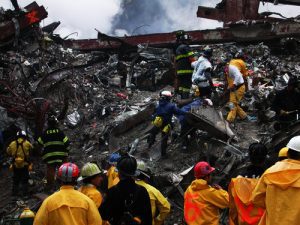
High Rate of Neuropathy for Ground Zero Survivors. A study recently published in the Journal of Occupational and Environmental Medicine from the National Institute for Occupational Safety and Health (NIOSH) revealed that World Trade Center (WTC) survivors are at an increased risk for neuropathy symptoms. This study emphasizes the recent findings of related experiments […]

High Rate of Neuropathy for Ground Zero Survivors. A study recently published in the Journal of Occupational and Environmental Medicine from the National Institute for Occupational Safety and Health (NIOSH) revealed that World Trade Center (WTC) survivors are at an increased risk for neuropathy symptoms. This study emphasizes the recent findings of related experiments performed by doctors at Long Island’s prominent Winthrop University Hospital that Ground Zero exposure led to neuropathy symptoms in patients who had been 9/11 responders.
Currently, neuropathy is not listed among the conditions required for a WTC survivor to be eligible for health coverage and benefits under the Zadroga Act, however doctors and patients trust that the recent studies may convince officials to amend these conditions.
Neuropathy is a term that refers to general diseases or malfunctions of the nerves. Nerves at any part of the body may be damaged from injury or disease. Neuropathy is frequently classified according to the types or location of nerves that are affected. Neuropathy can also be classified according to the disease causing it. For example, neuropathy from the effects of diabetes is called diabetic neuropathy.
Toxins and poisons can damage nerves. For example, lead, arsenic, mercury, some industrial solvents, nitrous oxide, and certain pesticides can adversely affect nerves.
The personal injury attorneys at Parker Waichman LLP are actively reviewing potential claims on behalf of individuals who have suffered illnesses related to Ground Zero exposure.
 The Winthrop study performed experiments that exposed rat sciatic nerves to WTC dust. An in-vitro study demonstrated that exposure to a methanol extract of WTC dust lessened the conduction velocity in rat sciatic nerve. The reason for this study was to examine whether the prevalence of neuropathic symptoms, as measured by the Michigan Neuropathy Screening Instrument (MNSI), was greater in people exposed to toxic dust at the WTC than people who were not exposed.
The Winthrop study performed experiments that exposed rat sciatic nerves to WTC dust. An in-vitro study demonstrated that exposure to a methanol extract of WTC dust lessened the conduction velocity in rat sciatic nerve. The reason for this study was to examine whether the prevalence of neuropathic symptoms, as measured by the Michigan Neuropathy Screening Instrument (MNSI), was greater in people exposed to toxic dust at the WTC than people who were not exposed.
That information was expanded on with a survey of 9/11 survivors and responders to determine if they were at an increased risk for neuropathy than the general population. Sixteen patients with WTC exposure were evaluated by a neurologist. Two WTC-exposed patients had motor neuron disease and not neuropathy.
All participants had a neurologic examination. Most had electromyogram (a test that records the electrical activity of muscles) and nerve conduction testing and nerve conduction studies performed, as well as imaging and blood tests.
Significant findings included that neuropathic symptoms were more severe in people with a greater exposure to Ground Zero. Also, neuropathic symptoms may occur at a higher rate in the WTC-exposed people than in diabetes patients. In addition, a strong connection between lung disease and neuropathy scores imply the exposure pathways may be the same, but alternate pathways such as dermal (skin) absorption may also be involved.
The dust from the WTC contains numerous potential neurotoxins, including heavy metals and complex hydrocarbons. Many responders noted neuropathic symptoms during clinic visits.
Taking into consideration medical condition, age, and depression, “neuropathic symptoms are much more common in those exposed to WTC dust and increases with increasing exposure. This study provides evidence that exposure to WTC dust is associated with neuropathic symptoms,” reports the Journal of Occupational and Environmental Medicine.
The researchers deducted that “this study suggests that WTC dust exposure does result in an increased risk of neuropathy in responders and survivors of the WTC.” Researchers also noted that “our findings have strong policy implications and suggest that neuropathy should be added to the list of conditions covered” under the Zadroga Act.
It also emphasizes that the scope of neurologic problems related to WTC exposure may include other diagnoses such as motor neuron disease. Motor neuron disease is a rare condition that progressively damages parts of the nervous system. This leads to muscle weakness. Motor neuron disease is also known as amyotrophic lateral sclerosis (ALS), and occurs when nerve cells in the brain and spinal cord called motor neurons stop working properly. This is known as neurodegeneration.
The Zadroga Act permits diseases to be added to the list of eligible conditions when there is evidence of a causal connection. The Winthrop study is further evidence that neuropathy may occur by exposure to WTC dust and should be added to the list of conditions covered by the Federal WTC Medical Monitoring and Treatment program. When the Act was reauthorized in 2015, benefits were extended for 75 years, until 2090.
The personal injury attorneys at Parker Waichman LLP offer free, no-obligation case evaluations. For more information, fill out our online contact form or call 1-800-YOURLAWYER (1-800-968-7529).


